With today’s endless amounts of tech being utilised around the home, I bet you’re just like me and have quite a few products that use AA or AAA batteries. If so, then this product could prove to be your very best friend!
In fact, if like me you also have children who enjoy playing with endless amounts of toys that use these types of batteries, you’ll be investing in one, I’m quite sure of it!
If I were to list the items around our house that use AA/AAA cells, I’d be here for quite some time. So, a quick run down would include: Remote Controls, Radio Control Cars/Helis, Mechanical toys, Clocks, Xbox controllers, Digital Cameras…. and so on. I’ll also admit that I’ve never been a fan of rechargeable batteries, as they don’t seem to last long between charges, especially for products that drain the power quickly. Instead, I find myself popping into my local ASDA store to buy a pack of 18 AA batteries for around £8 ($12) which to be honest, don’t go very far in my house.
So, when Julie asked if anyone would like to try out this gadget, I simply jumped at the chance!
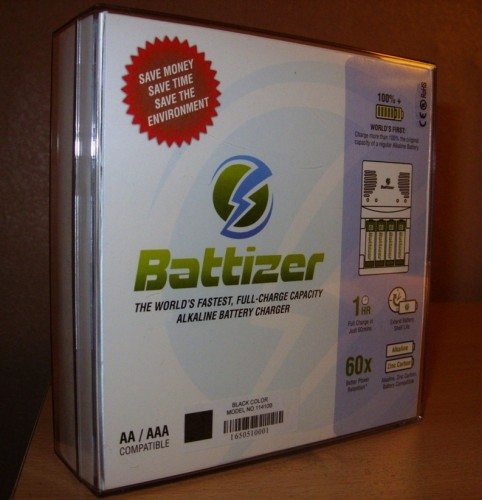
It’s called the Battizer. And, with help from a built-in microprocessor that constantly monitors the battery charging process, it has been designed to recharge any discharged AA or AAA Alkaline, Zinc Carbon, NiMh and NiCD batteries. In fact, the manufacturers state that the Battizer will do this within one hour, without any heat (which we all know is one of the main causes of battery damage) and it will also charge a battery to ‘more’ than its original capacity.
Not only this, but the Battizer has also been designed to erase the memory effect that can occur on rechargeable batteries, reconditioning and effectively restoring the cell to its full charge capacity. Plus, it has been designed to operate quicker than a normal battery charger, helping you to save money in the long-term, which in turn helps the environment.
Let’s take a closer look!
What’s in the box?
I received my review unit directly from Battizer and it arrived in a nicely sealed plastic case which also provided lots of information, in the form of pictures and text about the unit itself and what it can do. The products were all securely fitted inside, thanks to the foam insert.
Inside the box you’ll find:
- The Battizer
- 4 x AA Battizer ‘Super’ 1.5V Alkaline cells (Designed especially for the Battizer)
- Power cable
- Instructions on CD
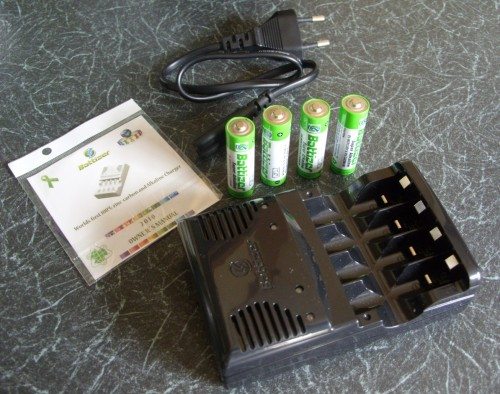
Although, I have to point out that the plug on the cable is a two pin Euro plug (Type C), which unfortunately is no good in the UK. I had to provide my own plug converter so I could use it in the three-pin sockets that we have here.
However, the unit itself has been designed to work with either 110 or 220 volts, so it’s universal when it comes to the voltage that it will accept.
In use
To be honest, the Battizer is so simple to use, my kids could use it. There are no switches to move or buttons to press. You just place each battery into the holder and provide power from the mains. Each LED on the panel above each cell flashes during the charging phase, but will remain solid when it’s complete. Although, I have point out that if you choose to charge NiMh or NiCD cells, the LED’s will not light up. You simply insert them in the normal way and then watch the clock for an hour until they’re done.
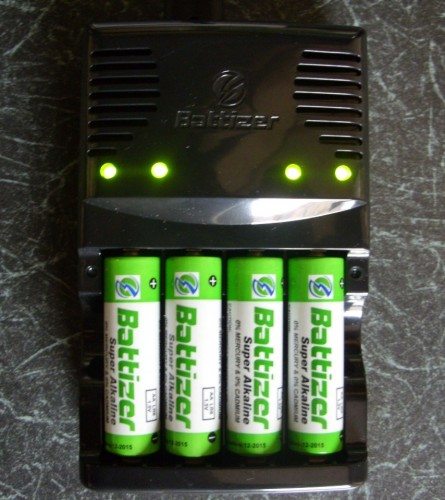
As stated earlier, there are four alkaline batteries included, which have been designed specifically for the charger itself, so I placed each one into the Battizer and plugged it into the mains. The LED’s immediately began to flash and after approximately 50 minutes, the LEDs were a solid green, indicating that the charging phase had completed. There is no audible warning to alert you that charging has completed, nor is there an automatic switch off, so you’ll have to keep the unit in sight to ensure you remove the cells once they are fully charged.
Whilst the unit was plugged in, I also wanted to charge some used cells (cheap alkaline types that I paid about £1.50 for) that I knew were ready to throw away. They had been used in my R/C Heli the previous week and were removed from the controller. They were no longer providing any charge to the heli, so I knew they were pretty much wasted. So, I inserted them both into the unit and waited until the LED was a solid green. This took just a little under one hour and once removed they weren’t warm at all, compared to other chargers that tend to heat up cells.
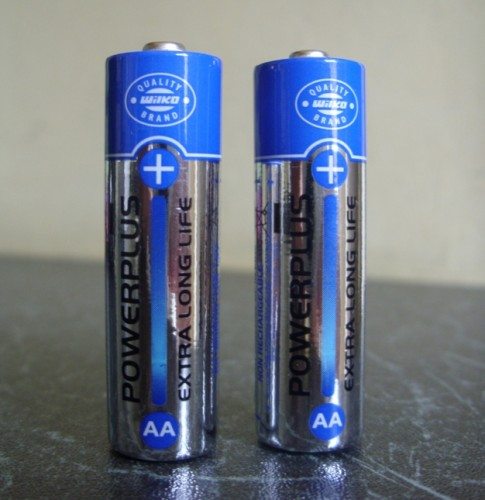
I then tested these by placing them into my digital camera, which indeed showed a full battery indication!
It has to be noted however that although the Battizer does indeed charge drained alkaline batteries, as per test above, Battizer DO NOT recommend doing this unless they are either rechargeable types (NiMh or NiCD) , or the specially designed alkaline cells provided for you in the box. Standard alkaline or zinc carbon batteries from companies such as Duracell are really not designed to be recharged, so if you do decide to use it for this purpose, you do so at your own risk. Please take care when doing this, as damage could possibly occur.
Battizer also recommend that you:
- Do not charge leaking batteries, as chemicals will damage the charger
- Recharge drained batteries immediately in order to achieve the best results
- Do not attempt to recharge batteries that have been stored for a long period of time
- Use it with the recommended Battizer Super Alkaline Batteries
- Dispose of any discharged batteries responsibly
After testing the alkaline cells, I also charged two NiMh cells that I had sitting in my cupboard. As mentioned earlier, I’m not a huge fan of NiMh cells at all, so tend not to use them much. However, once charged I did notice that they took far more pictures in my digital camera than they normally would after a couple of hours in the standard charger. I think continued discharging and recharging using the Battizer will restore them to their normal charging capacity.
Whichever way you look at it, the Battizer is definitely a worth-while investment. Not only does it allow you to recharge alkaline batteries, but thanks to it’s advanced design features, it will also help retain the overall charge of a cell for longer and also help to keep your rechargeable NiMh or NiCD cells in top condition. It’s also kinder to the environment thanks to it’s quicker charging times.
A Battizer Alkaline Battery Charger costs $77, which if you think about how much you’ll save in the long term is a great bargain! This also includes a 30 day money back guarantee, if for any reason you are not happy with the product.
Each charger also comes with a 12 month warranty and there are five colours to choose from (Black, White, Pink, Green & Blue) and you can buy one directly from Battizer.
Apple iPhone FineWoven Wallet with MagSafe – Black
(as of February 23, 2026 13:39 GMT -06:00 - More infoProduct prices and availability are accurate as of the date/time indicated and are subject to change. Any price and availability information displayed on [relevant Amazon Site(s), as applicable] at the time of purchase will apply to the purchase of this product.)ESR for MagSafe Wallet, 5-Card Holder With RFID Blocking, MagSafe Sticker Included, Slim Magnetic Wallet for iPhone 17/16/15/14/13/12 Series and Selected Samsung Devices, Not for 13/12 Mini, Black
(as of February 23, 2026 12:35 GMT -06:00 - More infoProduct prices and availability are accurate as of the date/time indicated and are subject to change. Any price and availability information displayed on [relevant Amazon Site(s), as applicable] at the time of purchase will apply to the purchase of this product.)Product Information
| Price: | $77 (£52) |
| Manufacturer: | Battizer |
| Pros: |
|
| Cons: |
|

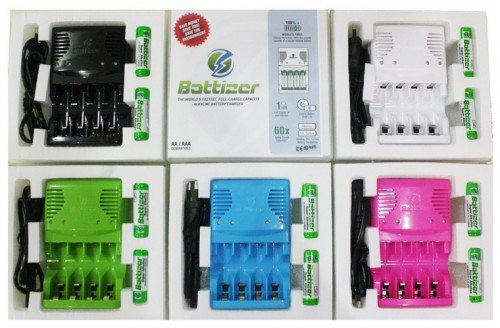


Gadgeteer Comment Policy - Please read before commenting
The batteries we provided in the box are better quality alkaline batteries called super alkaline battery. They give you longer lasting power than normal alkaline battery. There are other brands of super alkaline battery in the market.
The only difference between Battizer batteries and other brands is that there is no warning label on our batteries against charging it.
We cannot claim that our charger can charge any brand of alkaline, zinc carbon or heavy duty battery due to possible legal issue as it is stated clearly on those batteries that it cannot be charged as it may explode. This warning label is to warn consumers not to charge those batteries using chargers found in the market which are mostly meant for rechargeable battery (NiMH or NiCD).
We do not sell additional Battizer super alkaline batteries at the moment. All our customers are happily charging other batteries they bought off the shelf.
Our charger is a fast and full-charge capacity alkaline battery charger that also charge and recondition rechargeable battery.
So if I understand the fine print correctly, this charger is NOT designed to charge any alkaline battery, just the special alkaline batteries the company sells???
I think I’ll take a pass on this. And at $77, this charger is overpriced…
@hihat, if you read Battizer’s response, there are other brands of super alkaline batteries on the market that can be purchased and recharged.
We do not sell any battery at all. The batteries we include in the set is a better quality alkaline battery called super alkaline battery. It has longer lasting power than normal alkaline battery. Search on the web for “super alkaline battery” and you will find other brands. There is nothing special about our battery.
Our charger is called Battizer Alkaline Battery Charger that charge AA and AAA size zinc carbon, zinc chloride (Heavy Duty), alkaline, NiMh and NiCD batteries.
I’ve been using my Battizer happily for about a month and a half. Most all generic alkaline batteries charge just fine it, although I’ve had better success with the name brands than the generic store brands. That’s not to say the generic’s won’t recharge, they just tend to wear out faster and take less charges.
Great product! Should save a lot of money over time.
I have been curious about this product and give it try. It really perform as promised. Have charged and revive different alkaline batteries that are destined to be trashed. The recharged batteries performed like new ones.
It is a great product especially it is Singapore made! It should pay for itself overtime. But more import, it is a environmental friendly that reduce wastage. Strongly recommended for photographers who need to use high power drainage flash and PnP cameras.
I charged 2 AAA Engerniser Alkaline batteries till the green light stop blinking, and then use it on my air-con remote control. It worked, but the next morning they went flat and was leaking. I then change to another 2 similarly recharged batteries. But, after an hour, they were very warm. What can be the reasons?
Hi Cheong,
Maybe the cells you charged were worn. I’ve had a problem with only two cells since I started using the product and that’s only due to the fact that they were unused for sometime. Every other cell I’ve recharged, whether they be zinc carbon, alkaline or standard rechargable types, they all seem to recharge without any issues. In fact, I’ve used the same AA alkaline cells in my Xbox 360 controllers for more than 3 months now… 🙂
Jay
Bought it @ S$65 last week, I am very happy with it. No need to buy any more batteries.. Charging was fast & batteries like new.
wow S$65? where u buy it from?? mind to share?
Even the “Super Alkaline” Battizer branded batteries didn’t work with the Battizer changer. It’s very frustrating to use this product. 50% of the time, the batteries cannot be charged and even if they are charged, the “charged” batteries cannot last. In the end i junked the Battizer charger. Waste of money.
I have experimented with alkaline chargers over the years. They are all not worth the time and expense. They all produce leaks and short-lived batteries. Let’s face it: Alkalines are not made to be recharged. There is a very technical reason that I’ve gone over and understand very well. First, Alkalines produce a lot of gas during recharging. This will collect inside the cell and cause it to rupture its seals. It may even take a week after charging for the seal to fail and leak inside your electronics. Alkalines are actually stabilized against gassing during discharging, but only up to a point, and not stable enough to be recharged. There is dendrite formation of the Zinc powder. The zinc will tend to form dendrites instead of a nice even plating of metal. This is why you might see a short increase of voltage, but it drops quickly once using the battery again. There is separator clogging of minute oxygen bubbles when the cell is discharged, which are difficult to re-absorb in recharging. There is drying of the electrolyte when the cell is discharged, since the water is used in the chemical process to make electricity. The water will not be replenished during recharging. The oxygen bubbles and dried electrolyte will produce a cell with high internal resistance, so if they do charge with some capacity, the cells would be useful for only very low powered devices such and clocks and remotes. “Rechargeable Alkaline” batteries from some manufacturers, such as the “super” alkaline seen here, are better stabilized against dendrite formation, have catalyst to convert some of the gas back into water, reduce the effects of separator clogging, and other enhancements to improve the chances of successful recharging. I’m going to suggest NiMh because they have been improved greatly over the years with Low Self Discharge technology. Sold as “stays charged longer” and “pre-charged” etc, they are stabilized to a point where they actually take years to lose their charge completely. They can replace Alkalines is more applications since there is no worry of the battery discharging itself. With batteries like these around, I cannot see why people would waste any more money on old technology rechargeable alkaline systems anymore and ruin there electronics with leaking recharged alkaline batteries.
I brought 2 battizers back in 2011 Jan and is still using it today.
The super alkaline batteries did not last and these days, I use the charger for both AA and AAA batteries, rangng from Ikea alkaline batteries to duracell batteries.
Great investment.
Wonder if Battizers are being retailed in Singapore? Hope to buy them as gifts.